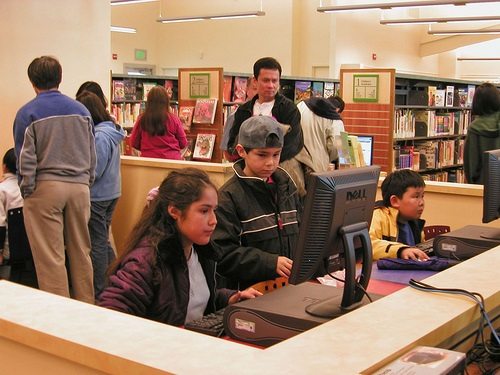
October 12, 2014; Miami Herald
This article in the Miami Herald describes yet one more way to stress out low income families—by assigning homework that requires an Internet connection and a working computer. This has driven many families in Dade County to the local library, where there are long waits for the computers. Although the library plans to beef up its digital access, “We really shouldn’t be requiring kids to go to the library to complete assignments,” Sylvia Diaz, assistant school superintendent for innovation, said. “A project or something special is OK, but not daily homework assignments that are dependent on computer use.”
Still, though this is the official position, according to this article, Miami-Dade…
“recently shifted to digital history textbooks for high-school freshmen, providing all ninth-graders with tablets containing the interactive books. County elementary schools now incorporate the online program called Reflex Math, which looks like a video game and can be accessed by students 24 hours a day. And with printed-material budgets under pressure, some students describe traditional textbooks as valuable commodities.
Sign up for our free newsletters
Subscribe to NPQ's newsletters to have our top stories delivered directly to your inbox.
By signing up, you agree to our privacy policy and terms of use, and to receive messages from NPQ and our partners.
“Isaiah Goulbourne, 16 and a junior at Miami Norland High, said there’s a textbook waiting for him each day for English, but it never leaves the classroom. ‘We’re not allowed to take them home because there aren’t enough for everyone,’ he said. ‘Most of our textbooks are accessible online.’
“Goulbourne said he relies on the North Dade library for online school work since he doesn’t have Internet access at home. It’s a common need at the branch, which sits in Miami Gardens, where one in five residents live below the poverty level.”
A survey of young library users in Dade County in 2011 found that almost half reported having no online access at home. Conversely, the schools estimate that only 25 percent of students are without access.
Access watchdogs assert that the pace of the use of online resources for teaching must align with the online access of low-income families or those families are placed at even a worse disadvantage by having to find a place to do homework.
“The sequencing has to make sense, otherwise you create deeper gaps,” said Zach Leverenz, CEO of EveryoneOn, a group that has also suggested that access issues are closer to the library’s figures. “What I don’t think is a good stop-gap is assuming students are going to be able to find public hot spots, including libraries.”—Ruth McCambridge












